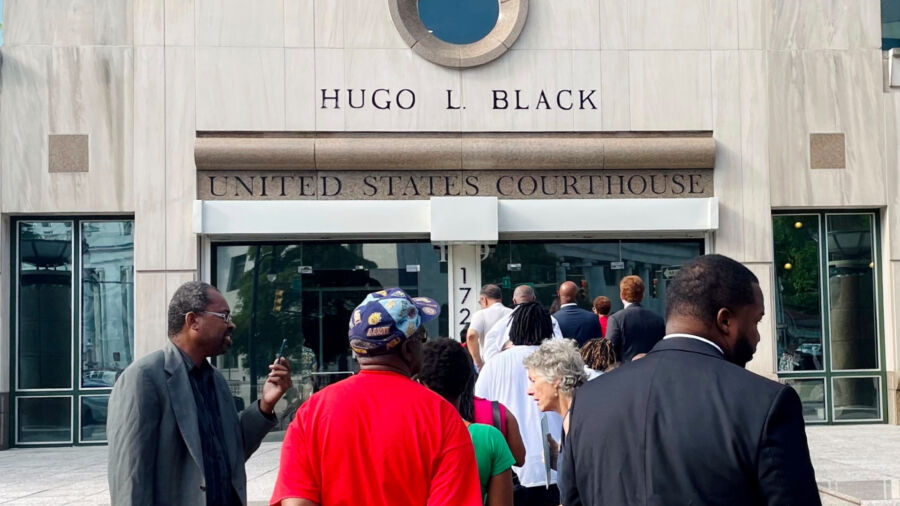A federal court approved a new congressional map for Alabama in time for the 2024 congressional elections, a move that is expected to boost Democrats’ electoral chances in the heavily Republican state.
The decision by a three-judge panel of the U.S. District Court for the Northern District of Alabama came on Oct. 5, after the same panel found two times before that the district lines made by the Republican-controlled state legislature appeared to violate the federal Voting Rights Act by diluting the voting strength of black voters.
Blacks make up 26.8 percent of Alabama’s population, according to the U.S. Census Bureau.
Alabama’s delegation to the U.S. House of Representatives currently consists of six Republicans and one Democrat. Both of the state’s U.S. senators, who are not affected by the redistricting process, are Republicans.
As a result of the new map, Alabama Republicans are expected to lose one of their House seats to Democrats, which may make it more difficult for Republicans to hang onto their majority status in the closely divided House.
The new map creates one majority-black district and another where blacks comprise a little under half of the populace. Both districts are now likely to elect Democrats.
The map reportedly used in the 2022 midterm elections contained one black-majority district, which is represented by Rep. Terri Sewell, a Democrat.
The new district boundaries imperil Rep. Barry Moore (R-Ga.) whose solid Republican district has suddenly become much more Democrat. Mr. Moore said on a radio program on Sept. 28 that he and his family are “seriously praying” about what he should do next.
The judicial panel was comprised of: U.S. Court of Appeals for the 11th Circuit Judge Stanley Marcus, who was appointed by President Bill Clinton in 1997; U.S. District Judge Terry Moorer, who was appointed by President Donald Trump in 2018; and U.S. District Judge Anna Manasco, who was appointed by President Trump in 2020.
The new map is expected to be used in the 2024 elections. State Republicans have said they will contest the map, but any legal proceedings are unlikely to be completed in time for next year’s elections.
New congressional maps for other states may soon be finalized.
Lawsuits arguing for increasing black representation are proceeding in Georgia and Louisiana and could lead to the adoption of new maps for those states.
The Republican majority in the North Carolina legislature may soon issue a new electoral map for the state.
In New York state, Democrats are fighting court-ordered redistricting that made the largely Democrat state more competitive.
The panel’s latest ruling comes after the Supreme Court voted 5–4 on June 8 to strike down Alabama’s electoral map for congressional elections, ruling that it was racially discriminatory.
Before that, in oral arguments in October 2022, U.S. Solicitor General Elizabeth Prelogar had weighed in against Alabama.
“Voting in Alabama is intensely racially polarized, about as stark as anywhere in the country,” she said. “The history and effects of racial discrimination in the state are severe. Black voters are significantly underrepresented.”
In the case, Allen v. Milligan, the court found that the map drafted by Alabama Republicans violated the provisions of the federal Voting Rights Act (VRA), which requires that states not racially gerrymander districts.
“A district is not equally open, in other words, when minority voters face—unlike their majority peers—bloc voting along racial lines, arising against the backdrop of substantial racial discrimination within the State, that renders a minority vote unequal to a vote by a nonminority voter,” Chief Justice John Roberts wrote for the court.
Justice Clarence Thomas penned a dissenting opinion, which was joined by Justices Neil Gorsuch, Amy Coney Barrett, and Samuel Alito.
“The question presented is whether [Section] 2 of the Act … requires the State of Alabama to intentionally redraw its longstanding congressional districts so that black voters can control a number of seats roughly proportional to the black share of the State’s population,” Justice Thomas wrote at the time.
“Section 2 demands no such thing, and, if it did, the Constitution would not permit it.”
“At the outset, I would resolve these cases in a way that would not require the Federal Judiciary to decide the correct racial apportionment of Alabama’s congressional seats,” Thomas wrote.
The text of the VRA is focused “on ballot access and counting,” he added.
After the Supreme Court ruled, the state legislature drew up a new congressional map that judges subsequently found suffered from the same defects.
On Sept. 5, the district court struck down a map that was drawn in July, finding that state lawmakers failed to follow an earlier court order requiring that they adhere to the federal Voting Rights Act. The court ordered that a special master and a cartographer would have to prepare a new, statutorily compliant map.
Along the way, Alabama asked the Supreme Court to intervene in the case but on Sept. 26 it refused to do so, leaving its June ruling intact.
Alabama Secretary of State Wes Allen, a Republican, said he would comply with the new court order.
“The Office of the Secretary of State will facilitate the 2024 election cycle in accordance with the map the federal court has forced upon Alabama and ordered us to use,” Mr. Allen told The Epoch Times by email.
“It is important for all Alabamians to know that the legal portion of this process has not yet been completed. A full hearing on the redistricting issue will take place in the future and I trust [Republican] Attorney General [Steve] Marshall to represent Alabama through that process. In the meantime, I will keep our state’s elections safe, secure and transparent because that is what I was elected to do.”
The Epoch Times reached out to the U.S. Department of Justice for comment.
From The Epoch Times

